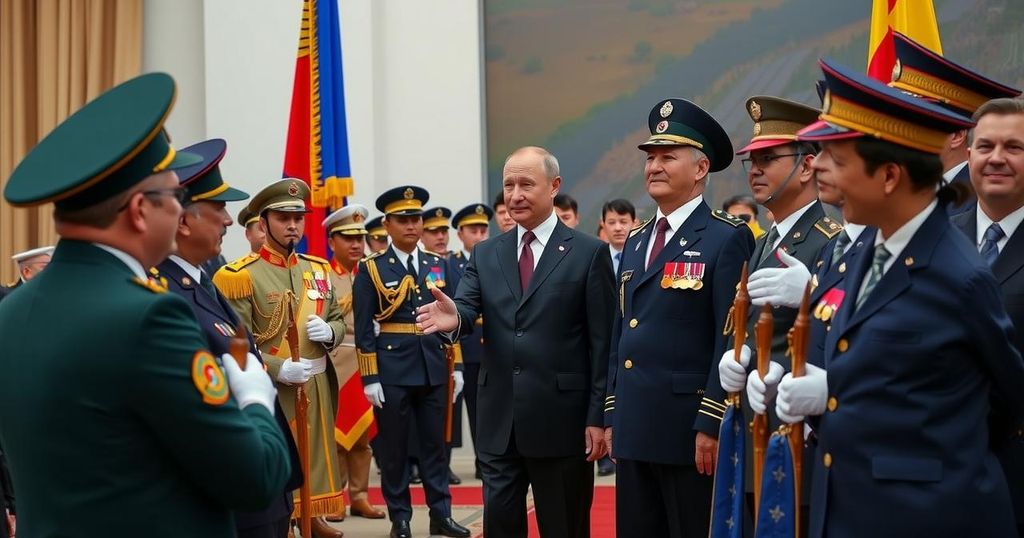Putin’s Visit to Mongolia Sparks Controversy Over War Crimes Claims
President Putin visited Mongolia, emphasizing cooperation while disregarding ICC arrest warrants for war crimes. His presence sparked criticism from Ukraine and the EU for Mongolia’s failure to adhere to international obligations regarding the ICC. Local sentiments were mixed, with some supporting stable ties with Russia and China, while protests against Putin were limited due to tight security.
On Monday night, Russian President Vladimir Putin arrived in Ulaanbaatar, Mongolia, embarking on a visit that reflects a defiance against international calls for his detention due to war crimes charges from the International Criminal Court (ICC). Meeting with Mongolian President Ukhnaagiin Khurelsukh at the iconic Genghis Khan Square, Putin praised the bilateral relations and expressed mutual support on global issues. However, his presence raised significant concerns among human rights advocates and international officials, who criticized Mongolia for not complying with the ICC’s obligations.
Putin is wanted by the ICC for the purported illegal deportation of Ukrainian children following Russia’s invasion of Ukraine in 2022. Ukrainian Prosecutor General Andriy Kostin condemned Mongolia for hosting Putin, stating, “Today, Putin humiliated Mongolia by cynically using it as a bargaining chip in his geopolitical game.” In response to the situation, an EU spokesperson expressed regret that Mongolia failed to adhere to the Rome Statute. Meanwhile, U.S. officials acknowledged Mongolia’s challenging geopolitical position but maintained that the country should uphold the rule of law.
Mongolia, a nation balancing relations between the authoritarian powers of Russia and China, has maintained its neutrality on the Ukraine conflict and abstained from United Nations votes regarding it. Locally, opinion is mixed; some citizens, like economist Altanbayar Altankhuyag, believe that arresting Putin would be improper due to China and Russia’s importance as neighbors. The Kremlin has dismissed concerns over a potential arrest during the visit, emphasizing the significance of stable relations with Mongolia.
The visit marked an anniversary celebration of a pivotal victory over Japan by Mongolian and Soviet forces. Genghis Khan Square, adorned with Mongolian and Russian flags, hosted tight security and a limited protest presence, indicating a complex societal response to the Kremlin leader’s visit. Police intervention curtailed protests by activists who sought to express their opposition to Putin’s presence in the country, thereby highlighting the complexities of free expression in Mongolia today.
The present visit of President Putin to Mongolia occurs against a backdrop of serious international scrutiny regarding his alleged war crimes amid the ongoing conflict in Ukraine. The ICC has issued an arrest warrant, pressing members to detain him if he enters their jurisdiction. Mongolia, sitting strategically between Russia and China, has traditionally fostered bilateral relationships with both countries since its transition from Soviet influence. This visit not only symbolizes Mongolia’s diplomatic balancing act but also evokes critical responses from the international community regarding its obligations under international law.
In conclusion, President Putin’s visit to Mongolia illustrates the intricate dynamics at play in international politics, particularly concerning the relationship between smaller nations and greater powers. Despite international pressures and war crime allegations, Mongolia’s actions during this visit reflect its intention to maintain favorable relations with both Russia and China. The criticisms from Ukraine, the European Union, and human rights advocates underscore the ongoing tension between geopolitics and accountability under international law.
Original Source: www.channelnewsasia.com




Post Comment